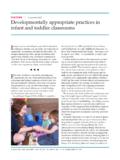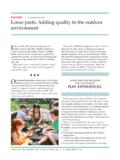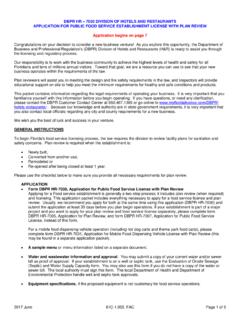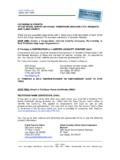Transcription of Texas child care minimum standards
1 Texas child care quarTerly / winTer 2016 / VOluMe 40, nO. 3 / care licensing rolled out the first set of minimum standards updates Sept. 1, 2016. The updates in September were part of federal require-ments based on the child care Development Block Grant (CCDBG) of 2014. These new standards are now available at you know? You can download the standards to your comput-er, smart phone, and tablets. When you open the document, if you enter Ctrl F you will then have a search box. Enter any key word or number into this feature, and it will bring up all of the standards that have that word or number associated with it.
2 In the example, if you enter Food Allergy you can select Enter and this will take you through all the standards with the word or number you are searching. standards are dated, so if you want to see all stan-dards updated in 2016, you can enter 2016 in the search feature. Also located on the Department of Family and Protective Services website, you will find a docu-ment titled Display of September 2016 This document includes only standards that were updated in the September 2016 updates. This is a great resource to create a checklist to ensure that your operation has covered all the updates in your policies and programing needs.
3 See child care licensing has provided a wonderful resource to providers regarding the September 2016 updates. This resource contains scenarios for direc-tors to think about and consider for compliance with child care licensing Texas child care minimum standardsthe new standards that were released September 2016. Topics include food allergy plans; emergency preparedness; handling, storage, and disposing of hazardous materials; and health and safety trainings. The website can be found at There are many updates in the licensing world! The September 2016 updates were required with the federal CCDBG Act.
4 child care licensing was already in the process of its own, state-mandated, minimum - standards comprehensive review that takes place every six years. What does this mean for you? In March 2017, there will be new updates to stan-dards based on our required six-year comprehen-sive review. Technical assistance will be provided for the March 2017 updates. A webinar similar to the one available for CCDBG will also be available for our comprehensive changes. As of the writing of this article, the proposed rules have NOT been adopted. Proposed rules can be found at consider Training for directors and staff is a pivotal part of all staff s professional development.
5 With the new rules there are no changes to the number of required training hours. Training content was added with the CCDBG rules and most of this training is already incorporated with the existing Agrilife trainings. It is your responsibility to ensure that the trainings/trainers you select meet all criteria for trainers and training content per the minimum standards . child care licensing is a division of the department of Family and Protective services (dFPs). it regulates and monitors child care operations in Texas . For more information about child care licensing and its services, visit Texas child care quarTerly / winTer 2016 / VOluMe 40, nO.
6 3 / to keep in mind when selecting training appear below. (See all of child care licensing s training tips in italics below. standards are listed in bold.) Does licensing approve training resources or trainers for training hours? No. We do not approve or endorse training resources or trainers for training hours. You should, however, ensure you and your employees receive relevant training from reliable resources, in topics specified in this division, and that participants receive original documentation of completion, as specified in this division. We recommend that you: Ask the trainer to provide you with a r sum or vita showing relevant experience and education, or be certain you are obtaining training through reliable sources in the community who have veri-fied the presenter s qualifications for you.
7 Ask to see a copy of the certificate your employees will receive and to preview the materials before entering into an agreement to purchase any training. Must the training for my caregivers and the director meet certain criteria? Section (a) You will need to ensure that the training you have selected meets the criteria in (1)-(7). Please ask the trainer in advance how they meet the standard and verify this infor-mation is current. (a) Training may include clock hours or CEUs pro-vided by one of the following: (1) A training provider registered with the Texas Early care and Education Career Development System s Texas Trainer Registry, maintained by the Texas Head Start State Collaboration Office.
8 (2) An instructor who teaches early childhood development or another relevant course at a secondary school or institution of higher education accredited by a recognized accred-iting agency. (3) An employee of a state agency with relevant expertise. (4) A physician, psychologist, licensed profes-sional counselor, social worker, or registered nurse. (5) A person who holds a generally recognized credential or possesses documented knowl-edge relevant to the training the person will provide. (6) A director at your child care center who has demonstrated core knowledge in child development and caregiving if: (A) the director is providing training to his or her own staff; and (B) your child care center has not been on probation, suspension, emergency suspension, or revocation in the two years preceding the training or been assessed an administrative penalty in the two years preceding the training.
9 (7) A person who has at least two years of expe-rience working in child development, a child development program, early childhood edu-cation, a childhood education program, or a Head Start or Early Head Start program and: (A) has been awarded a child Development Associate (CDA) credential; or (B) holds at least an associate s degree in child development, early childhood education, or a related field. (b) Training may include clock hours or CEUs obtained through self-instructional materials, if the materials were developed by a person who meets one of the qualifications in subsection (a) of this section.
10 (c) Self-instructional training may not be used for CPR or first-aid certification. In addition to verifying that the trainer meets the requirement of the standards , you will also want to make sure that their training meets the items (d)(1)-(4). (d) All training must include the following: (1) specifically stated learning objectives; (2) a curriculum, which includes experiential or applied activities; (3) an evaluation/assessment tool to determine whether a person has obtained the informa-tion necessary to meet the stated objectives; and (4) a certificate of successful completion from the training source.













